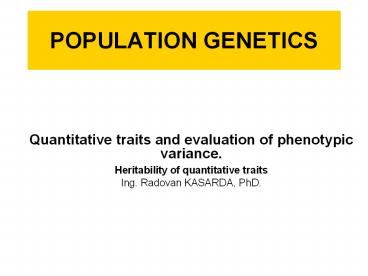POPULATION GENETICS - PowerPoint PPT Presentation
1 / 16
Title:
POPULATION GENETICS
Description:
POPULATION GENETICS Quantitative traits and evaluation of phenotypic variance. Heritability of quantitative traits Ing. Radovan KASARDA, PhD. Estimation of ... – PowerPoint PPT presentation
Number of Views:93
Avg rating:3.0/5.0
Title: POPULATION GENETICS
1
POPULATION GENETICS
- Quantitative traits and evaluation of phenotypic
variance. - Heritability of quantitative traits
- Ing. Radovan KASARDA, PhD.
2
Estimation of Heritability
- Method parent offspring h2OP
- similarity (kinship) between parents and
offspring - according to Wright (1920) relationship
coefficient is 0,5 - comparison of relatives between groups
- h2 is twice of rXY resp. regress coefficient bYX..
Principle of calculation
Pair X Y X2 Y2 X.Y
1 production of mother production of daughter
n
S X S Y SX2 SY2 SX.Y
To calculate rXY resp. bYX estimate semi-values
A, B, C.
variance of X variance of Y
covariance between X and Y
3
Estimation of Heritability
- Method parent offspring h2OP
than
In case data are divided by fathers, calculate
partial Ai, Bi, Ci separatelly for each father
and sumarize it.
4
Estimation of Heritability
- Method parent offspring h2OP
With use of ANOVA
Father Variance s2 Covariance ni ni .s2i ni.covXY
1 710 77 20 14200 1540
2 520 154 30 15600 4620
3 800 100 30 24000 3000
4 400 20 20 8000 400
1 640 128 40 25600 5120
2 700 70 10 7000 700
4 530 78 20 10600 1560
2 480 35 20 9600 700
3 550 90 30 16500 2700
4 640 64 30 19200 1920
S 250 150300 22260
5
Method half-sibs - ANOVA
- half-sibs have one common parent (father)
- use of genetic similarity between half-sibs
(0,25) - universal method
- Conditions of use
- groups of half-sibs in same conditions (min. 3 in
group) - group based by father (min. 3 fathers) (p)
- in group min. 3 measurements (ni)
- i.e. min. 9 measurements in total (n)
6
ANOVA initial informations
Father i Daughter j Prod. kg Yij Yi. Yi.2/ni Y2ij
1 1 5 25
2 20 400
3 30 Siyij 55 1008,33 900
2 1 30 900
2 20 400
3 30 Siyij 80 2133,33 900
3 1 30 900
2 25 625
3 35 Siyij 90 2700 1225
S p 3 ni3 n 9 Y.. 225 Y.. 225 Y2i.5841,66 Si Sj Y2ij 6275
s2e
s2g
s2e
s2g
s2e
7
ANOVA One Way
S DF MS s2
fgp -1 MSgSgfg
fen - p MSeSefe
S F MS s2
216,666 2 108,333 12,037
433,33 6 72,222 72,222
h24.ri
s2P s2g s2e 84,259 ri 0,143 h2 0,57
8
ANOVA full-sibs
- in populations of multiparous animals (pigs,
poultry,..) - high genetic similarity of full-sibs (0,5), whose
should under equal conditions show equal
phenotype - difficult for segmentation
- in group variability of environment
- between groups variability depended on diverse
genetics of mothers - between classes variability deperded on diverse
genetics of fathers - s2P s2F s2M s2E
- two-factorial ANOVA is used
- i father j mother k progeny
9
ANOVA initial informations
Father i Mother j Daughter k Trait Yijk Yij. Yi.. Y2i../ni Yij.2/nij Y2ijk
1 1 1
2
3
2 1
2
3
3 1
2
3
S p mi nj SY... SY2i../ni Si Sj Y2ij/nij Si Sj Sk Y2ijk
10
ANOVA two factorial
S DF MS s2
fFp -1 MSFSFfF
fMm - p MSMSMfM
fen - m MSeSefe
k1 average of daughter per mother k2
average of mother per father k3 average of
daugh. per father
11
ANOVA two factorial
12
ANOVA Half-sibs
- Exercise Calculate heritability
p8 Yi. Yi.2/ni Y2ij
1 75,94 288,3430 288,6938
2 75,50 285,0112 285,7600
3 79,33 314,6611 315,2639
4 77,98 304,0430 304,6091
5 73,65 271,2151 271,7600
6 76,38 291,6943 292,1326
7 75,34 283,8047 284,1924
8 75,33 283,7295 284,1279
ni20 SY.. SY2i. /ni Si Sj Y2ij
13
ANOVA Full-sibs
- Exercise
- p 10 m 130 n 1955
- MSF391,3 k115,00
- MSM37,50 k215,40
- MSE6,40 k3193,00
- Calculate
- s2F h2F
- s2M h2M
- s2E h2FM
- s2P
14
Non-parametric estimates of heritability
- very good elaborated
- used if less information is known
- low number of observation, ranking evaluation
- could resuld in non-realistic estimates
- only informative results of h2
- analyses of influence of genotypes on traits
- Estimates by Young
- estimates using Spearman correlation coeficients
- estimates based on realised heritability
15
Non-parametric estimates of heritability
- Estimates by Young
above-average mothers below-average
mothers above-average daughters below-average
daughters
- Estimates using Spearmann rank-order correlation
coefficient
mother rank 5,5 5,5 10
daughter rank 9 8 4
d 3,5 2,5 6
h2 rS
d absolute difference between mother and
daughter ranking
- Calculate heritability
16
Non-parametric estimates of heritability
- estimates based on realised heritability
- by division of pop. on better () resp. worser
(-) half
O offspring P - parents
- according to realized selection
- realized genetic gain - selection difference
(di.s)
- difference of selected offspring from average
of off. generation - difference of selected
parents from average of parental generation































